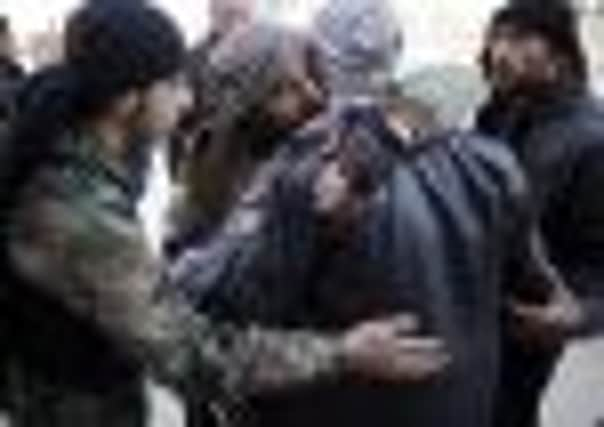Henry Cronin: We must remember Ulster and not rush to judgment over Middle East uprisings


When they marched, they were attacked by rival factions in the presence of police officers who, because of their religious affiliation, did not prevent the attacks and in some cases supported them with their own attacks. As full-scale riots developed. the Army was deployed on to the streets. Some of these Army units also supported the minority religious group and therefore, as in the case of the police, stood back while people were burnt out of their homes.
Over a short period of time, the situation had deteriorated into full-scale street battles as one of groups armed themselves to protect the lives and their homes.
Advertisement
Hide AdAdvertisement
Hide AdThis in turn led to the Army, directed by the national government, to arrest people without evidence of wrongdoing and to internment without trial. Some of those detained were treated in a degrading and inhumane manner.
This in turn led to an escalation of violence. In one month alone, 97 people died, many of them civilians.
The suppression of the group fighting for their civil rights was met with condemnation from a number of countries, including America, in particular the use of force and detaining people without charge or trial.
No, I’m not talking about the Arab uprising and the events in Egypts, Libya, Bahrain, Tunisia or Syria. I am outlining the events that took place in Northern Ireland in 1969 and into the 1980s.
Advertisement
Hide AdAdvertisement
Hide AdBetween 1970 and 1979, 2,095 people died in Northern Ireland.
America sent congressman to investigate allegations of abuse but Britain denied them access to the Maze Prison. The European Court of Human Rights reported that five techniques used in coercive interrogation constituted torture. There is no doubt that what started as a civil rights movement to address the clear manipulation of the political systems in favour of the loyalist minority group became an all-out civil war between terrorist and the British government. Therefore, when you look at the “Arab spring” uprisings, how do you judge the validity of the protesters against their government’s response?
There are many layers to this question. The first is in regard to the democratic structures that are in place within each of these countries. The test we use in the West would appear to be based on how head of each state has come to power.
If there is no democratic election process, we would then question their right to be in a position of power. Does this lack of democratic processes, as the Western governments perceive it, legitimise the actions of those involved in the uprising?
Advertisement
Hide AdAdvertisement
Hide AdIn Northern Ireland, there was a lack of democratic processes in the election of local politicians. Therefore, while 60 per cent of Derry City was made up of Catholics, 12 of the 20 local politicians in power were from a Protestant background because of the gerrymandering of the election boundaries.
In Northern Ireland, it was not the Army or the terrorist that resolved the inequalities, but a determined political solution.
The foreign policy of many Western governments over the past centuries has consisted of two main strands. The first was to invade and conquer a power weaker then you. The second was to make friends with them if stronger than you. Many of the countries now involved in the Arab Spring have been former colonies of Western nations, in particular, France.
The present situation across a number of Middle East countries is dangerous. Are the actions of the Western nations lessening that danger or increasing it?
Advertisement
Hide AdAdvertisement
Hide AdIt could be said that because many of our politicians never served in the armed forces they commit armies to go to war without the insight of what this means on the ground.Therefore we are quite happy to go to war and kill and maim hundreds, if not thousands, as in the case of Iraq and Afghanistan until we start suffering severe casualties of our soldiers.
The next action, short of war, is to support those fighting against the incumbent government as we did with the rebels in Libya. There are a number of other actions, escalation of sanctions, which we support without thinking of the consequences for the ordinary people living in that country.
Therefore, when I hear US Secretary of State Hillary Clinton speaking about human rights and casualties of civilians in Syria, I do wonder if she thinks about the thousands of Iraqi civilians killed by American forces when they invaded? When I hear William Hague speak about democracy, I wonder why he does not talk about Saudi Arabia and Bahrain.
Many of our politicians seem to have a monopoly on telling us what is evil, when they appear unable to distinguish that the killing of people in one war in a cause they have instigated and supported and call just, is no better than people being killed in the cause they have not instigated nor supported and they call unjust.
Advertisement
Hide AdAdvertisement
Hide AdEdmund Burke, the English philosopher, said “that for evil to triumph it is only necessary for good men to do nothing”.
I am not sure that when it comes to the Middle East that there are enough good men doing anything. You do not impose democracy from the outside; you grow it from the inside.